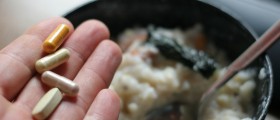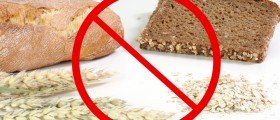
Unlike food allergy where theimmune system gets activated, or food poisoning where toxic substances causethe same reactions to all consumers of contaminated food, food intolerance is areaction that a person experiences every time they have certain foods andingredients, especially in larger quantities. The common cause of foodintolerance is the body’s inability to produce enough enzymes in order to digest certain types of food.
One example of this is intolerance of cow’smilk due to the substance called lactose found in it. The small intestine of thehuman body produces the enzyme called lactase which processes milk sugar sothat it can be absorbed into the bloodstream. People with low lactaseproduction experience symptoms similar to irritable bowel syndrome (IBS). People intolerant of alcohol havea shortage of alcohol dehydrogenase enzyme, while others can’t take chemicalpreservatives added to food and drinks, including benzoates, salicylates,caffeine, aspartame and monosodium glutamate. A person can also experience a‘pseudo-allergic reaction’, when the body has a shortage of specific enzymes, toxic byproducts and histamine accumulate, creating the symptoms of an allergy. Infants are born with high levels of lactase, the production of which drops after one or twoyears, even though lactose intolerance symptoms usually appear later in life. If a person experiences gastroenteritis, the body may temporarily produce lowerlevels of lactase, which particularly affects children.
The symptoms of foodintolerance can appear within hours after the troublesome food or drinkconsumption, but sometimes they occur several days afterwards and includenausea, bloating, stomachache and diarrhea. Alcohol intolerance manifestsitself through a headache, nausea, palpitations, flushed skin and feelingfaint. Depending on the quantities of food consumed and enzymes produced by theperson’s body, symptoms may range from mild to severe, though they are usuallynot harmful.
To determine if a person has somesort of food intolerance it is recommended to refrain from the food in question forsome time and then start consuming it again. Returned symptoms can indicatethat food intolerance is present. Also, a GP can diagnose lactose intoleranceby administering tests such as hydrogen breath test, stool acidity test orlactose tolerance test. The only way to treat the condition is to exclude thefood in question from the diet. In babies and small children with lactoseintolerance, cow’s milk can be replaced with soy milk, almond milk and rice milk. Another alternative is hypoallergenic milkformula, while adults can use lactase enzyme drops or capsules.
The best way to determine if you have a food intolerance (home remedy) is to consume symptom causing food in low quantities. If symptoms occur, the food can be removed from the diet in short term intervals. However, once the certain food is removedfrom the diet, nutrient deficiencies might occur, so food intolerant personsshould seek the advice of a licensed dietitian. Such consultation is essential before any changes are introduced to a persons diet, especially that of a child.

















Your thoughts on this
Loading...